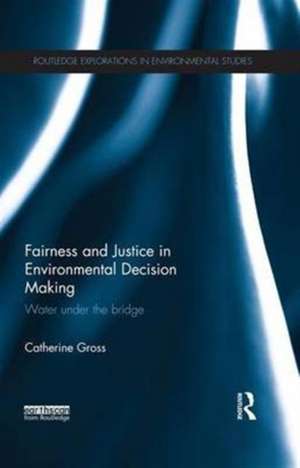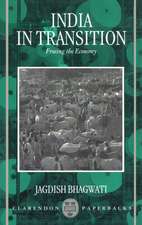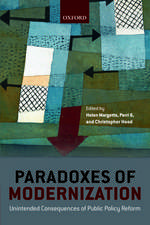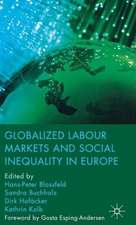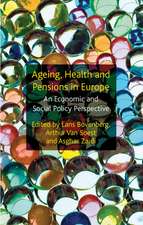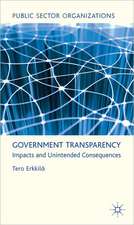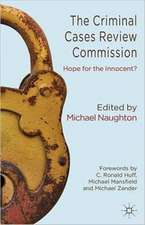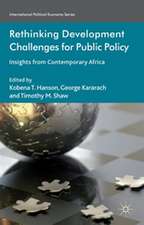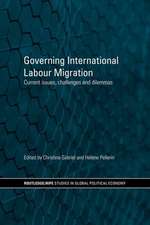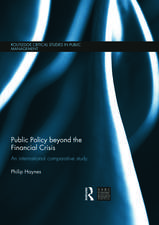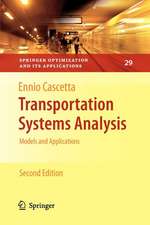Fairness and Justice in Environmental Decision Making: Water Under the Bridge: Routledge Explorations in Environmental Studies
Autor Catherine Grossen Limba Engleză Paperback – 24 apr 2016
Focusing on two social conflicts over water sharing in Australia to show why fairness and justice are important in decision-making, the book shows how these conflicts are typical of water sharing and other natural resource conflicts experienced in many countries around the world, particularly in the context of climate change. It tells the stories of these conflicts from the perspectives of those involved. These practically-based findings are then related back to ideas and constructs of justice from disciplines such as social psychology, political philosophy and jurisprudence.
With a strong practical focus, this book offers readers an opportunity to develop a deep understanding of fairness and justice in environmental decision-making. It opens up a wealth of fairness and justice ideas for decision-makers, practitioners, and researchers in natural resource management, environmental governance, community consultation, and sustainable development, as well as people in government and corporations who interface and consult with communities where natural resources are being used.
| Toate formatele și edițiile | Preț | Express |
|---|---|---|
| Paperback (1) | 234.90 lei 6-8 săpt. | |
| Taylor & Francis – 24 apr 2016 | 234.90 lei 6-8 săpt. | |
| Hardback (1) | 542.69 lei 6-8 săpt. | |
| Taylor & Francis – 7 ian 2014 | 542.69 lei 6-8 săpt. |
Din seria Routledge Explorations in Environmental Studies
-
 Preț: 281.77 lei
Preț: 281.77 lei -
 Preț: 243.63 lei
Preț: 243.63 lei -
 Preț: 289.74 lei
Preț: 289.74 lei -
 Preț: 294.74 lei
Preț: 294.74 lei -
 Preț: 326.82 lei
Preț: 326.82 lei -
 Preț: 310.88 lei
Preț: 310.88 lei -
 Preț: 310.29 lei
Preț: 310.29 lei -
 Preț: 326.49 lei
Preț: 326.49 lei -
 Preț: 311.41 lei
Preț: 311.41 lei -
 Preț: 311.41 lei
Preț: 311.41 lei -
 Preț: 279.47 lei
Preț: 279.47 lei -
 Preț: 324.20 lei
Preț: 324.20 lei -
 Preț: 378.44 lei
Preț: 378.44 lei -
 Preț: 410.07 lei
Preț: 410.07 lei -
 Preț: 444.62 lei
Preț: 444.62 lei -
 Preț: 480.62 lei
Preț: 480.62 lei - 12%
 Preț: 325.34 lei
Preț: 325.34 lei -
 Preț: 443.65 lei
Preț: 443.65 lei - 18%
 Preț: 1056.32 lei
Preț: 1056.32 lei -
 Preț: 442.50 lei
Preț: 442.50 lei -
 Preț: 461.50 lei
Preț: 461.50 lei -
 Preț: 421.63 lei
Preț: 421.63 lei -
 Preț: 449.41 lei
Preț: 449.41 lei - 18%
 Preț: 1060.52 lei
Preț: 1060.52 lei - 18%
 Preț: 1109.99 lei
Preț: 1109.99 lei - 25%
 Preț: 852.63 lei
Preț: 852.63 lei -
 Preț: 389.38 lei
Preț: 389.38 lei - 18%
 Preț: 699.99 lei
Preț: 699.99 lei - 15%
 Preț: 418.51 lei
Preț: 418.51 lei -
 Preț: 414.32 lei
Preț: 414.32 lei -
 Preț: 407.57 lei
Preț: 407.57 lei - 18%
 Preț: 1056.28 lei
Preț: 1056.28 lei - 26%
 Preț: 846.09 lei
Preț: 846.09 lei -
 Preț: 438.30 lei
Preț: 438.30 lei - 15%
 Preț: 423.09 lei
Preț: 423.09 lei -
 Preț: 448.44 lei
Preț: 448.44 lei - 13%
 Preț: 296.95 lei
Preț: 296.95 lei - 18%
 Preț: 1167.92 lei
Preț: 1167.92 lei - 16%
 Preț: 65.03 lei
Preț: 65.03 lei - 31%
 Preț: 767.88 lei
Preț: 767.88 lei
Preț: 234.90 lei
Preț vechi: 401.86 lei
-42% Nou
Puncte Express: 352
Preț estimativ în valută:
44.95€ • 46.76$ • 37.11£
44.95€ • 46.76$ • 37.11£
Carte tipărită la comandă
Livrare economică 12-26 aprilie
Preluare comenzi: 021 569.72.76
Specificații
ISBN-13: 9781138686755
ISBN-10: 1138686751
Pagini: 180
Dimensiuni: 156 x 234 x 20 mm
Greutate: 0.45 kg
Ediția:1
Editura: Taylor & Francis
Colecția Routledge
Seria Routledge Explorations in Environmental Studies
Locul publicării:Oxford, United Kingdom
ISBN-10: 1138686751
Pagini: 180
Dimensiuni: 156 x 234 x 20 mm
Greutate: 0.45 kg
Ediția:1
Editura: Taylor & Francis
Colecția Routledge
Seria Routledge Explorations in Environmental Studies
Locul publicării:Oxford, United Kingdom
Public țintă
PostgraduateCuprins
1. A Global Concern: Seeking Fairness in Resource Sharing 2. Theories of Justice and the Search for Fairness 3. Developing a Justice-based Research Approach 4. Voices and Stories: Two Water Conflicts in Australia 5. Finding Injustice - Seeking Justice 6. A Sense of Justice - Processes and Outcomes 7. Muddying the Waters: Worldviews, Institutions and Change 8. Justice as a Means and an End in Environmental Decision-making
Recenzii
"A clear and compelling case for fairness as a foundation for resource sharing. Catherine Gross' book is essential for those wanting to understand the role of fairness and justice in preventing social conflict". Paul R. Ehrlich, Bing Professor of Population Studies, Stanford University, USA
"Building on real-world examples of environmental conflict over wind power and water access, the author clarifies what fairness and justice mean to those affected. She then argues the need for a theory of justice to guide environmental decision-making and to optimise fairness, as understood and seen. A timely book, as environmental tensions mount." Professor Tony McMichael, Australian National University, Australia
"Building on real-world examples of environmental conflict over wind power and water access, the author clarifies what fairness and justice mean to those affected. She then argues the need for a theory of justice to guide environmental decision-making and to optimise fairness, as understood and seen. A timely book, as environmental tensions mount." Professor Tony McMichael, Australian National University, Australia
Descriere
By crossing disciplinary boundaries, this book uniquely connects theories of justice with peoples lived experience within social conflicts over water sharing arrangements. The book puts emphasis on portraying the different perspectives held by people involved in the conflicts and how these tap into their thoughts and experience of fairness and justice. The book shows why practical considerations of different aspects of fairness and justice are important in environmental decision-making.
